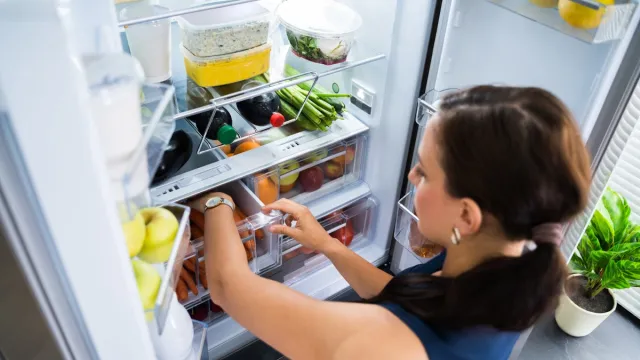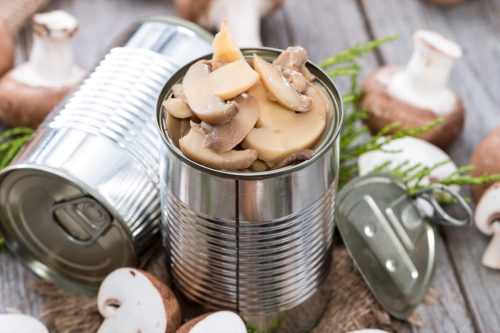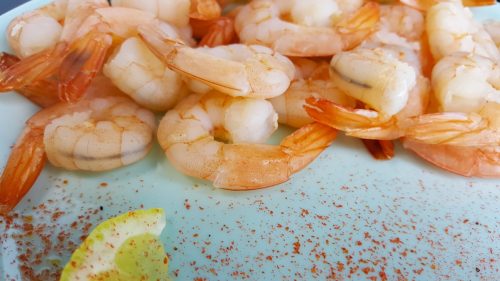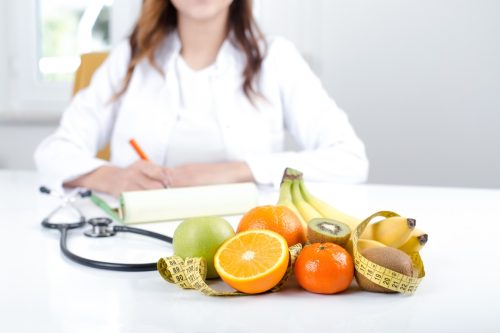Nutritionist Reveals 3 “Gross” Foods She’ll Never Eat and the Horrifying Reasons Why

Most of us think carefully when it comes to the foods we’re eating, whether we’re trying lose weight or just want to eat better. But even the most health-conscious eaters could be consuming things that are a little, well, unwise. Leanne Ely, a certified nutritionist and founder of SavingDinner.com, shares expert guidance to viewers through her TikTok account, @savingdinner. In one of her most viral videos last year, Ely revealed the three “gross” food she’d never eat as a nutritionist. Read on to discover the horrifying reasons behind her decision, and why you might want to steer clear of these foods, too.
RELATED: I’m a Nutritionist and I Lost 30 Pounds Doing These 3 “Very Chill” Things.
1
Canned mushrooms

The first food on Ely’s “gross” chopping block? Canned mushrooms. According to the nutritionist, guidance from the U.S. Food and Drug Administration (FDA) allows an average of around 20 maggots per 100 grams in a can of mushrooms before the item is considered defective or unsafe.
“So instead, let’s go with fresh mushrooms,” Ely advises in her TikTok. “And we know what they grow in, but you can wash them, you can dry them, and you can chop them up fresh. I promise, no maggots.”
RELATED: 6 Things You Should Never Leave Out on the Counter, Food Experts Warn.
2
Shrimp that haven’t been deveined

Seafood lovers might struggle with Ely’s second pick: shrimp. But don’t panic! The nutritionist notes that she still “loves shrimp”—it’s just the ones that haven’t been deveined that she won’t eat.
“You know that vein that’s on the back of them? That’s not a vein, that’s their intestinal tract,” Ely explains. “That’s shrimp poop.”
Gross but true. That black line on the back of shrimp is not a vein, but rather its digestive tract—so it is waste that you’re seeing, according to the Aquaculture Stewardship Council (ASC). But while it’s actually safe to eat, Ely recommends you avoid doing so anyway.
“Pull that vein out before you cook them for heaven’s sake and enjoy your shrimp,” she says. “Just get that vein out of there.”
RELATED: I’m a Doctor and These Are the 5 “Food Secrets” of the Longest-Living People.
3
Artificial vanilla

The third thing Ely says she “won’t touch” as a nutritionist is artificial vanilla. Why? Artificial vanilla is made of castoreum, which is produced from the castor sacs of beavers, according to the nutritionist.
“It’s in their butts. Who wants beaver butt in their vanilla ice cream? I sure don’t,” Ely says. “Instead, go with pure vanilla extract. Sure, it’s a little more expensive but at least it comes from vanilla bean and not a beaver’s butt.”
This claim is a bit harder to prove, though Allrecipes points out that because castoreum is considered safe by the FDA, companies don’t have to let you know they’re using it in their products. And yes, it can show up in artificial vanilla.
Not all commenters mind the alleged grossness.

Ely’s TikTok video has garnered over 1.5 million views, with many sounding off in the comment section about her suggestions. While a lot of people thanked the nutritionist for her guidance, some were particularly combative about her canned mushrooms inclusion—which she addressed in a follow-up TikTok video.
“Maggots are totally a fine source of lean protein,” one person replied to her original video.
In her follow-up TikTok, Ely says she’d gotten a lot of other comments that expressed a similar sentiment.
“I don’t know if they’re kidding or not. But all I can say is, for me, I want to eat maggot-free,” she declares.
Best Life offers the most up-to-date information from top experts, new research, and health agencies, but our content is not meant to be a substitute for professional guidance. When it comes to the medication you’re taking or any other health questions you have, always consult your healthcare provider directly.
- Source: FDA: Food Defect Levels Handbook